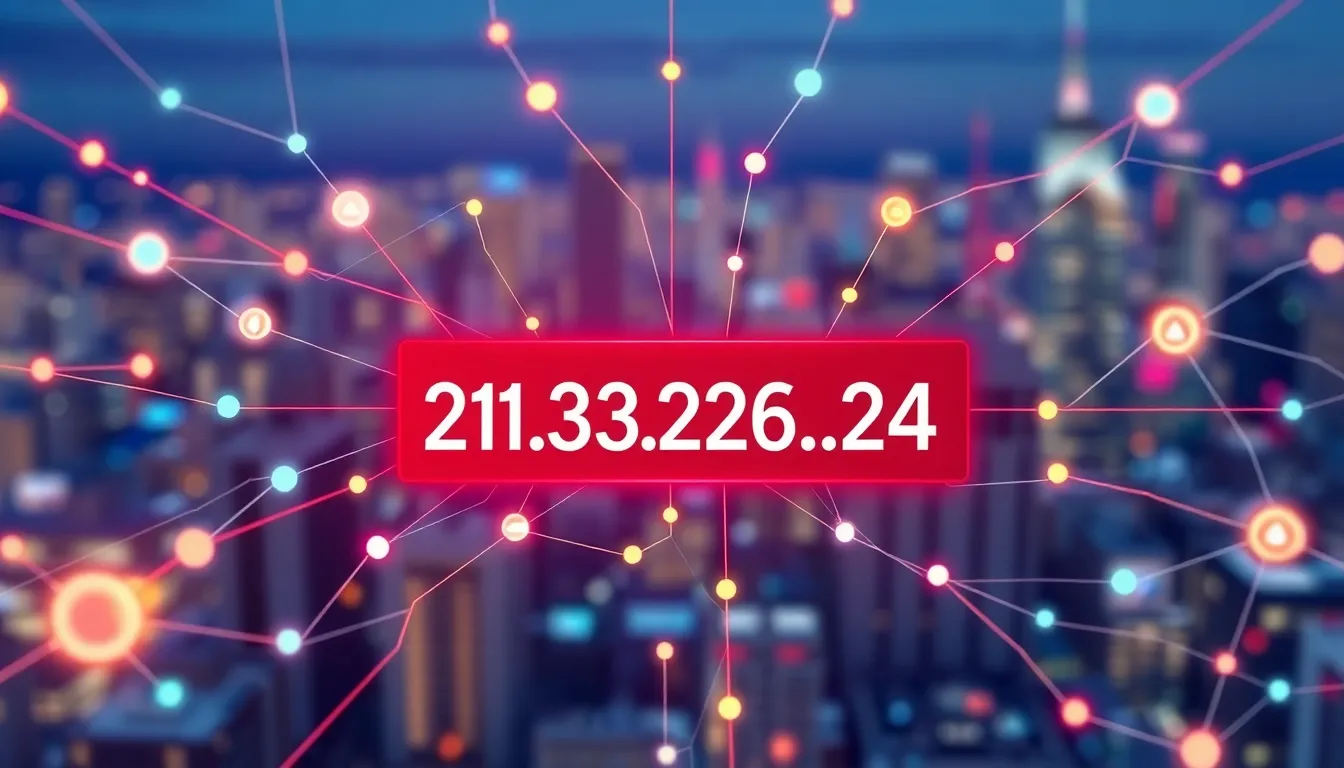In the vast universe of IP addresses, 212.32.226.324 stands out like a quirky neighbor who always has the best stories. But what’s behind this seemingly random string of numbers? For the curious minds, this IP could be a gateway to understanding how the internet connects us all, or it might just lead to a rabbit hole of tech jargon that makes your head spin faster than a hamster on a wheel.
Whether you’re a tech enthusiast or someone who’s just trying to figure out why your Wi-Fi keeps dropping, diving into the world of 212.32.226.324 can be both enlightening and entertaining. So buckle up, because this isn’t just another boring tech article—it’s a journey into the digital realm where laughter meets learning, and you might even impress your friends with your newfound knowledge.
Table of Contents
ToggleOverview of 212.32.226.324
The IP address 212.32.226.324 does not exist in the official IPv4 addressing space. IPv4 addresses consist of four octets, each ranging from 0 to 255. Common examples of IPv4 addresses include 192.168.1.1 and 8.8.8.8.
Referencing a valid IP address structure, the combination of digits for 212.32.226.324 exceeds the maximum allowable value for the fourth octet. Therefore, this address cannot be used in network configurations or internet routing.
Exploring the internet’s address space reveals numerous functioning IP addresses. For instance, many service providers and websites occupy valid ranges within the IPv4 system. These addresses facilitate the routing of data across the globe, allowing devices to communicate effectively.
Understanding the implications of invalid IP addresses is crucial for network troubleshooting. Network administrators often encounter misconfigurations that lead to the use of non-existent IP addresses. Such issues hinder network performance and connectivity.
Analyzing browser request logs can help identify failed connection attempts stemming from the use of invalid IPs. Successful addressing relies on adhering to the established format and range, reinforcing the importance of accurate data entry in network management.
Content about IP addresses typically includes security implications and management tools. Comprehensive knowledge about IP address validity enhances cybersecurity practices, ensuring safer network environments. Tools like IP address validators and DNS lookup services offer further insights into legitimate addresses.
Importance of IP Addresses

IP addresses play a crucial role in the functioning of the internet. They enable devices to communicate with each other across networks, facilitating data exchange and connectivity.
What is an IP Address?
An IP address serves as a unique identifier for a device on a network. It consists of four octets in decimal format, each ranging from 0 to 255. Address recognition allows routing of data to the proper location. Without a valid IP address, a device cannot access the internet or connect with others effectively. Understanding IP addresses is vital for effective network management and troubleshooting.
Types of IP Addresses
Various types of IP addresses serve distinct purposes. Public IP addresses allow devices to connect with the broader internet. Private IP addresses operate within a local network, providing security and organizational benefits. Static IP addresses remain constant, while dynamic IP addresses can change over time, depending on network configurations. Each type plays a role in network design and efficiency, directly influencing connectivity and resource accessibility.
Understanding 212.32.226.324
The IP address 212.32.226.324 captivates interest despite its invalid status. It represents a numerical value beyond the maximum allowed for IPv4 addresses. Therefore, it cannot be assigned to any device or used in routing.
Geolocation Information
No geolocation information exists for 212.32.226.324 due to its invalidity. Every legitimate IP address can pinpoint a geographical location, making network management easier. Users typically depend on geolocation services to determine the origin of traffic sources. Such services utilize databases that map IP ranges to specific locations, facilitating better targeting in digital marketing or cyber threat responses.
Known Usage
212.32.226.324 holds no known usage in the real world, considering it isn’t a valid address. Users cannot find this IP address in typical applications, nor in trusted historical data. Common practices involve identifying valid IPs associated with services or organizations. Any invalid IP may represent issues during network setups, creating confusion among administrators. Proper knowledge of valid addresses significantly improves network reliability and efficiency.
Potential Issues Associated with 212.32.226.324
IP address 212.32.226.324 presents several issues despite its intriguing allure. Misconfigurations and misunderstandings can arise due to its invalid nature in the IPv4 space.
Security Risks
Invalid IP addresses like 212.32.226.324 pose unique security challenges. Attackers sometimes exploit the confusion surrounding invalid addresses to conduct reconnaissance on networks. Since this address cannot be assigned to any device, its occurrence may indicate scanning or probing attempts by malicious actors. Organizations lacking awareness of this invalid address might overlook potential threats, leading to vulnerabilities in their network defenses. Maintaining a clear understanding of valid IP format assists in identifying unauthorized access and enhances overall cybersecurity measures.
Privacy Concerns
Privacy issues arise when individuals mistakenly associate invalid IP addresses with legitimate networks. Users might believe that a device connected to the internet is valid, raising concerns about data leakage and unauthorized data collection. Without geolocation functionality, 212.32.226.324 can’t provide accurate location data, complicating efforts to track malicious activities or breaches. Awareness of legitimate IP formats safeguards users against potential privacy intrusions from unknown or invalid sources. Validating IP addresses ensures secure network management and protects end-users from inadvertent exposure to privacy hazards.
Exploring the quirks of 212.32.226.324 highlights the fascinating complexities of the internet. While this specific IP address may not hold any practical value due to its invalidity, it serves as a reminder of the importance of understanding valid IP configurations.
Navigating the digital landscape requires awareness of how IP addresses function and their role in network management. Knowledge of these concepts not only enhances technical skills but also bolsters cybersecurity practices. By staying informed about valid and invalid IP addresses, individuals and organizations can better protect themselves from potential vulnerabilities and ensure smoother connectivity.



